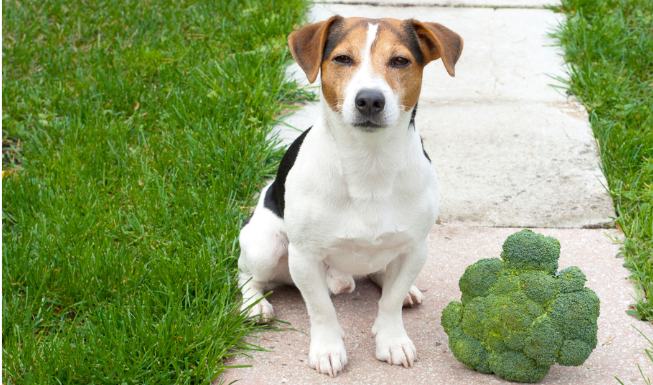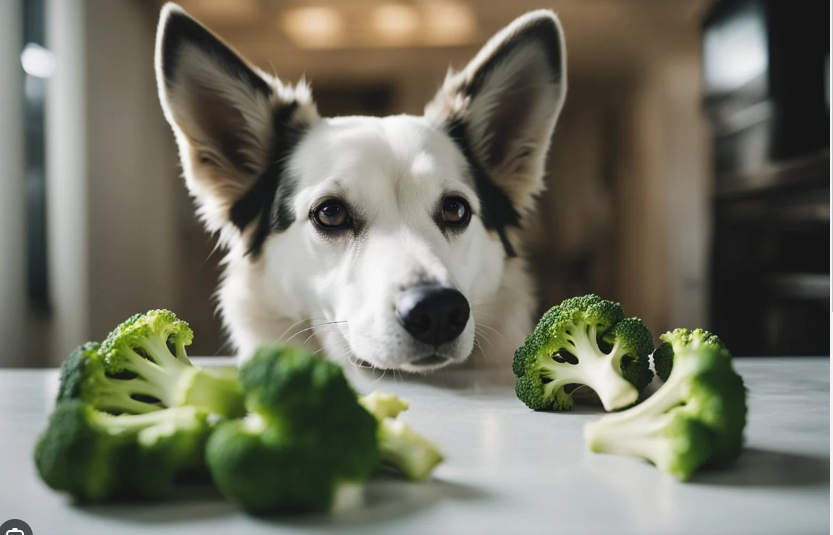
Broccoli is a healthy vegetable, and dogs can safely eat it in moderation. With its high fiber, vitamin, mineral, and antioxidant content, it’s often touted as a superfood.
Broccoli is non-toxic and nutritious for dogs in moderate portions. It’s a healthy snack or additive to a balanced doggy diet. Both adult dogs and puppies can enjoy broccoli.
Can Dogs Eat Broccoli?
Dogs can eat Broccoli in moderation, as it is a healthy veggie for their diet. Broccoli is a cruciferous vegetable that is part of the cabbage family. It contains several beneficial nutrients and compounds that can be great for dogs. Some of the main things broccoli contains include:
- Vitamin C – Supports immune system health.
- Vitamin K – Important for blood clotting.
- Fiber – Helps with digestion and bowel movements.
- Glucosinolates – Antioxidants that may help prevent cancer.
However, broccoli can be a nutritious snack or addition to a balanced dog diet. It does come with some possible drawbacks, though, which we’ll discuss as well.
The Potential Benefits of Broccoli for Dogs
There are several ways broccoli can provide health benefits for dogs. Here are some of the main advantages:
A Good Source of Vitamins and Minerals
Broccoli contains vitamins C and K, along with other essential nutrients. Vitamin C boosts the immune system, while vitamin K helps clotting blood. These water-soluble vitamins can’t be stored in the body, so regular intake through food is needed.
Broccoli also provides minerals like calcium, magnesium, and potassium, which support bone, muscle, heart, and digestive health. The fiber aids digestion as well. So broccoli delivers a spectrum of essential vitamins, minerals, and other compounds dogs need.

Contains Antioxidants
Broccoli contains beneficial plant compounds like glucosinolates and sulforaphane. These antioxidants may help protect cells from damage caused by molecules called free radicals.
Antioxidants from vegetables like broccoli can support overall health and reduce disease risk in dogs. The antioxidants in broccoli make it a superfood vegetable.
Supports Gut Health
The fiber content in broccoli and the antioxidants may also promote good gastrointestinal health in dogs. The fiber adds bulk to stool and promotes regular bowel movements. It also feeds the healthy bacteria in the gut microbiome.
That optimizes digestion and improves gut health. The antioxidants further reduce inflammation in the GI tract. So broccoli can be helpful for dogs prone to digestive issues.
Low-Calorie Snack Option
Broccoli is very low in calories, with only around 30 calories per cup. For dogs that tend to gain weight easily or need to lose some pounds, broccoli makes for a great low-calorie treat or snack. It provides volume and nutrients without a lot of calories.
The fiber also helps dogs feel full. So broccoli is a smart way to reward dogs while supporting a healthy weight.
Potential Concerns With Feeding Broccoli to Dogs
While broccoli has some excellent nutritional qualities, there are some potential downsides and precautions to consider.
Gas and GI Upset
Due to its high fiber and complex carbohydrate content, broccoli can sometimes cause gas, bloating, and gastrointestinal upset in some dogs. The starch and fiber take more time to break down, which could lead to loose stool or diarrhea if dogs overeat.
Feeding broccoli in moderation and keeping an eye on stool consistency is advisable. Well-cooked broccoli may be easier to digest.
Thyroid Problems
Some research also suggests that cruciferous vegetables contain goitrogens, compounds that can interfere with thyroid function. Dogs prone to hypothyroidism may want to limit broccoli intake after consulting with a vet.
However, most studies showing thyroid effects used large quantities of cruciferous vegetables over prolonged periods. Small amounts of broccoli fed intermittently are unlikely to cause problems in healthy dogs. But dogs with pre-existing thyroid issues may want to take precautions.
Choking Hazard
Finally, the stalks and florets of broccoli pose a choking risk for dogs, significantly smaller breeds. Cutting broccoli into small pieces is essential to minimize this potential hazard. Cooked broccoli that is soft may be the safest.
Pesticides
If feeding dogs raw broccoli, it’s best to buy organic to avoid any pesticide residue. Washing well can also help remove topical pesticides.
Overall, the concerns are manageable by taking basic precautions like cooking thoroughly, moderating portions, and purchasing organic.
Feeding Guidelines and Tips for Broccoli
When feeding broccoli to dogs, follow these tips for the best results:
- Introduce slowly and look for signs of GI upset. Start with a few small pieces at a time.
- Chop/cook until very soft to reduce choking hazards and enhance digestibility. Cooked and mashed broccoli is safest.
- Limit to 10% or less of total daily food intake. Around 3-4 florets for smaller dogs and 1⁄2 cup for larger dogs is a good amount.
- Mix with dog’s regular food for easier digestion rather than giving broccoli alone.
- Avoid seasoning with butter, oil, or salt. Plain-cooked broccoli is the healthiest.
- Organic broccoli reduces pesticide risks. Wash well if using non-organic.
- Store leftovers for 3-4 days at most. The vitamin C degrades over time. Fresh broccoli is best.
Can Puppies Eat Broccoli Safely?
Puppies can start to eat a small amount of broccoli after weaning once their digestive system has developed enough to handle it. Around 3-4 months old is a good time to introduce broccoli. Follow the same feeding guidelines outlined above for puppies, but use smaller portion sizes suited to the puppy’s size.
Some key considerations for feeding broccoli to puppies include:
- Cook or steam until very soft to avoid choking hazards.
- Start with just a few floret pieces at a time.
- Mix with puppy food/formula for easier digestion.
- Avoid gassy veggies for younger puppies prone to digestive issues.
- Monitor stool consistency and adjust amounts as needed.
- Don’t feed raw broccoli due to pesticide risks.
Check with your vet if you have concerns about introducing broccoli to your puppy. Most healthy puppies can start to eat small portions of cooked broccoli after 3-4 months old.
How Much Broccoli Can Dogs Eat?
When first introducing broccoli, go very slow with amounts. As little as a couple of florets, 2-3 times weekly is plenty for most small or medium-sized dogs. Giant breed dogs may be able to handle a few more florets. The fiber and nutrients in broccoli are very concentrated.
A general rule of thumb is limiting broccoli treats to 10% of their total daily food intake. For a dog eating 2 cups of dog food daily, that’s about 3-4 ounces total per week, or a few small broccoli florets 2-3 times a week at most.
You can gradually increase portions if your dog handles small amounts without digestive upset. But there’s no need to go overboard. Excessing vitamin A or dietary fiber causes issues in even the healthiest dog. Stick within the 10% broccoli rule for ideal nutrition without complications.
FAQs on Can Dogs Eat Broccoli?
Can I give my dog raw broccoli?
It’s best to avoid feeding dogs raw broccoli. The stiff stalks and florets pose a choking hazard, especially for smaller breeds. Lightly cooked or steamed broccoli is safer and more digestible for dogs.
How much broccoli can I give my dog?
A good general guideline is to limit broccoli to 10% or less of your dog’s total daily calories. For smaller dogs, a few florets 2-3 times a week is a good amount. Larger dogs can handle up to 1/2 cup portions a few times weekly.
Should I stop giving broccoli if my dog has gas?
It’s common for broccoli to cause some gas or digestive upset initially. Try reducing the amount or frequency. If symptoms persist, hold off on serving broccoli for a week or two, then retry a small amount.
Can puppies eat broccoli?
Puppies can start eating small amounts of cooked, chopped broccoli around 3-4 months old once their digestive system has matured. Start with a few pieces mixed with their puppy formula/food and monitor stool consistency.
Wrap Up
Dogs can safely eat broccoli in moderation. Broccoli can be a healthy addition to a balanced dog diet when fed properly. Just be mindful of portion sizes and preparation methods.
As with any new food, observe your dog’s response and adjust accordingly. But broccoli is excellent and beneficial for dogs to eat alongside regular dog food when fed responsibly.








